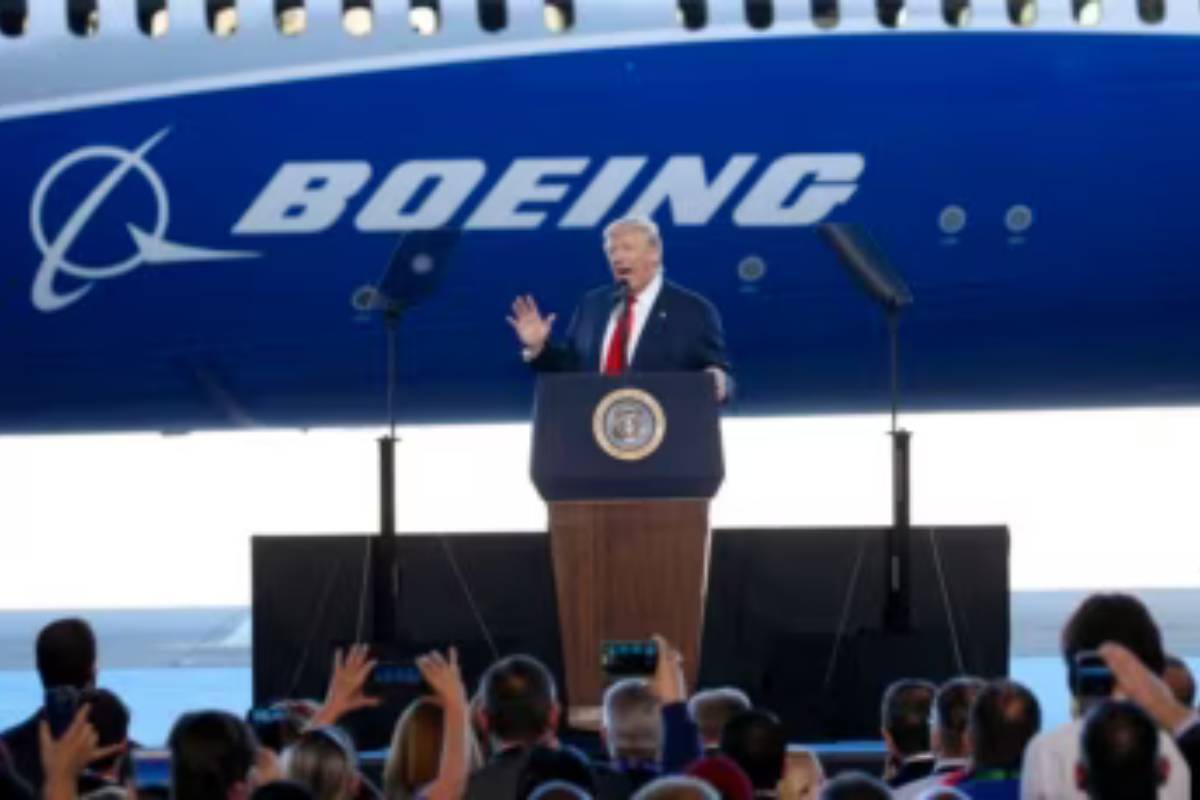The result appeared all but inevitable when South Korean President Lee Jae Myung entered the White House last month. Korean Air made a shocking announcement just hours after his meeting with Donald Trump: a $36.2 billion order for 103 Boeing aircraft. The timing wasn’t accidental; it’s now a defining characteristic of the Trump administration.
President Trump has turned Boeing aircraft into a sort of diplomatic currency since he returned to the White House and began his aggressive tariff campaign in April 2025. These days, almost all significant trade agreements include a Boeing order worth billions of dollars. It’s an intriguing and well-planned pattern.
The Boeing Blueprint: The Transformation of Aircraft into Diplomatic Instruments
Across continents, the playbook remains remarkably consistent. As part of their own trade agreement, Japan ordered 100 Boeing aircraft, following South Korea’s example. Agreements with Washington included Boeing purchases in Malaysia, Indonesia, and Cambodia. Days after the UK rejected a $10 billion Boeing purchase linked to its trade agreement, British Airways’ parent company, IAG, placed a separate $12.7 billion order for 32 planes.
“The simple answer is that planes are high profile and Trump always wants profile,” stated John Grant, founder of the aviation company Midas Aviation. He went on to say that airplanes are perfect focal points for these diplomatic displays because they are “very visible statements of trade and have a high value.”
But it’s not just symbolism.
The Reasons Airlines Continue to Accept Boeing Deals
Political theater is only one aspect of the strategic convenience.
Key Strategic Benefits:
- High-value Boeing orders help governments show they’re working to reduce their trade surpluses with the U.S., as explained by Wendy Cutler, vice president of the Asia Society Policy Institute. When Trump invoked emergency powers to begin his tariff campaigns, he pointed to the same imbalance.
- Purchases of aircraft also avoid political landmines at home. Planes don’t pose a threat to domestic industries like steel or agriculture imports do. According to Homin Lee, a senior macro strategist at Lombard Odier, “Unlike metals or agricultural imports, imports of these airplanes are not politically difficult for most trading partners of the U.S.”
Think about your options. Japan defends its rice farmers with vigor. As of 2024, South Korea is the fourth-largest exporter of steel to the United States and is not going to cut back anytime soon. Boeing takes the easiest route.
The Economic Basis of the Aircraft Purchases
For Boeing orders, the timing is ideal. The production backlog for the company currently stands at 11.5 years, with European competitor Airbus following closely behind at 10.6 years. Countries can commit now and spread out payments over ten years, giving them breathing room.
Kelly Ortberg, the CEO of Boeing, observes that the trade strategy has a direct effect on the company’s financial performance. “Everyone’s looking at their trade imbalance and saying, ‘How do I address that?'” he said during Boeing’s second-quarter earnings call. And there’s no better way than placing a sizable order for aircraft.”
Nor are the agreements merely political ploys. The world’s aviation sector is actually rebounding. According to the International Air Transport Association, airline profits will increase from $32.4 billion in 2024 to $36 billion in 2025. Overall revenue may surpass $979 billion, and margins are predicted to increase to 3.7%.
The Significance of Boeing in US Trade Policy
Unquestionably, symbolism is at play here. Boeing is “an iconic American company,” as Cutler notes. Purchasing from America entails purchasing Boeing, since Airbus is the only viable rival in the commercial aircraft market. It’s that easy.
Despite recent safety concerns, the company continues to dominate Trump’s trade theater. The diplomatic aircraft orders have not been halted by the 2024 Alaska Airlines door panel incident or continuing whistleblower claims regarding quality problems. Airlines are starting to notice the changes Boeing has made, and confidence seems to be rising again.
According to a June Reuters story, airline executives have reaffirmed their confidence in Boeing’s capacity to produce aircraft of the “right quality.” The market appears to agree, as Boeing’s stock has risen 70% since its April lows, when shares fell due to concerns about tariffs and China’s temporary delivery halt.
The China Factor: The Greatest Award for Boeing
The most important possible Boeing deal is still up for negotiation. Boeing is considering selling up to 500 aircraft to Chinese companies, according to a Bloomberg report from August. The size of the deal would give the faltering manufacturer a huge boost, but it is contingent on Washington and Beijing settling their ongoing trade dispute.
Trump’s top trade target has been China. This year, both nations imposed high tariffs on one another’s goods, including limitations that caused Boeing deliveries to be temporarily suspended. In May, the parties reached an agreement to temporarily reduce duties; as negotiations proceeded, the suspension was later extended by ninety days.
According to reports, Chinese officials have started evaluating the aircraft needs of domestic carriers, indicating that the huge Boeing purchase is being seriously considered. If approved, it would be the final confirmation of Trump’s trade policy focused on aircraft.
Benefits to All Parties Strategically
The trade agreements involving Boeing have several strategic objectives:
For the Trump Administration:
- They offer instantaneous, measurable proof of trade success
- The strong dollar values and focus on American manufacturing appeal to Trump’s supporters
For Foreign Governments:
- The agreements provide a diplomatic exit
- They can avoid making more politically delicate concessions while claiming to be resolving trade imbalances
- The lengthy delivery schedules allow for flexibility because today’s commitments do not need to be paid for or implemented right away
For Airlines:
- Real fleet modernization needs are advantageous
- The new planes are “crucial for modernizing the airline’s fleet,” according to Korean Air CEO Walter Cho, particularly as the airline merges with Asiana Airlines
- Frequently, the orders correspond with actual expansion and replacement needs
Historical Background: Diplomacy via Presidential Aircraft
American presidents have been in this position before. In 2011, President Obama boasted about Indonesia purchasing more than 200 Boeing aircraft, calling it “the largest deal, if I’m not mistaken, that Boeing has ever done.” Scale and methodical application make a difference.
From sporadic diplomatic triumphs to a regular aspect of trade talks, Trump has elevated aircraft orders. Markets now expect Boeing orders whenever significant trade negotiations are successfully concluded because the pattern has grown so predictable.
Wider Consequences for International Trade
The Boeing-centric strategy is indicative of broader changes in Trump’s foreign policy. He favors bilateral agreements that yield quick, observable results over multilateral agreements made through institutions like the World Trade Organization.
The aerospace sector can benefit practically from this approach. During trade negotiations, the U.S. administration has viewed the aerospace industry favorably, frequently exempting aircraft from tariff regimes:
- In May, a U.S.-UK agreement exempted aerospace products from 10% tariffs on British imports
- In a similar vein, aerospace goods were exempt from tariffs under a July U.S.-EU agreement
In 2025, Boeing initially projected that tariffs would cost the company $500 million. “If we continue to see this zero-for-zero [tariffs], I think we’ll… be able to beat that $500 million bogey that we’ve established,” said CEO Ortberg, who now believes the financial impact will be less severe.
The Sustainability Question
Long-term viability is called into question by the success of trade agreements involving Boeing. Will nations eventually object to what might seem like concerted pressure, or can the pattern continue indefinitely?
According to market analysts, demand for aircraft worldwide sustains ongoing orders. The need for new aircraft is legitimately driven by the need to modernize the fleet, increase passenger traffic, and expand cargo. The Trump administration’s strategy may be speeding up purchases that would have occurred regardless.
However, there may be vulnerabilities due to the concentration of orders in bilateral trade contexts. Aircraft orders may become negotiating chips or the subject of diplomatic disputes if trade relations worsen.
Looking Ahead: Boeing’s Part in Upcoming Trade Agreements
Boeing seems to be in a position to continue playing a key role in Trump’s trade offensive. The company is a perfect tool for diplomatic trade balancing because of its distinctive qualities, which include high value, American manufacturing, lengthy delivery times, and little competition.
This strategy will be put to the ultimate test in the upcoming China deal. Achieving success would provide the greatest possible scale validation for the aircraft-centric approach. Failure could make it necessary to reevaluate how heavily Boeing orders are used to show trade progress.
The pattern continues for the time being. Bringing a Boeing order to the negotiating table is the standard procedure for nations looking to negotiate advantageous trade terms with the US. The jets continue to fly off Boeing’s order books regardless of whether you believe this to be true economic progress or complex political theater.
There has never been a more obvious connection between international diplomacy and aerospace manufacturing. Boeing’s rise to prominence as America’s preferred trade ambassador is a result of both the company’s distinct market position and Trump’s penchant for conspicuous, measurable diplomatic successes. Sometimes the simplest solution is the one with wings in a world of intricate trade relationships.






















